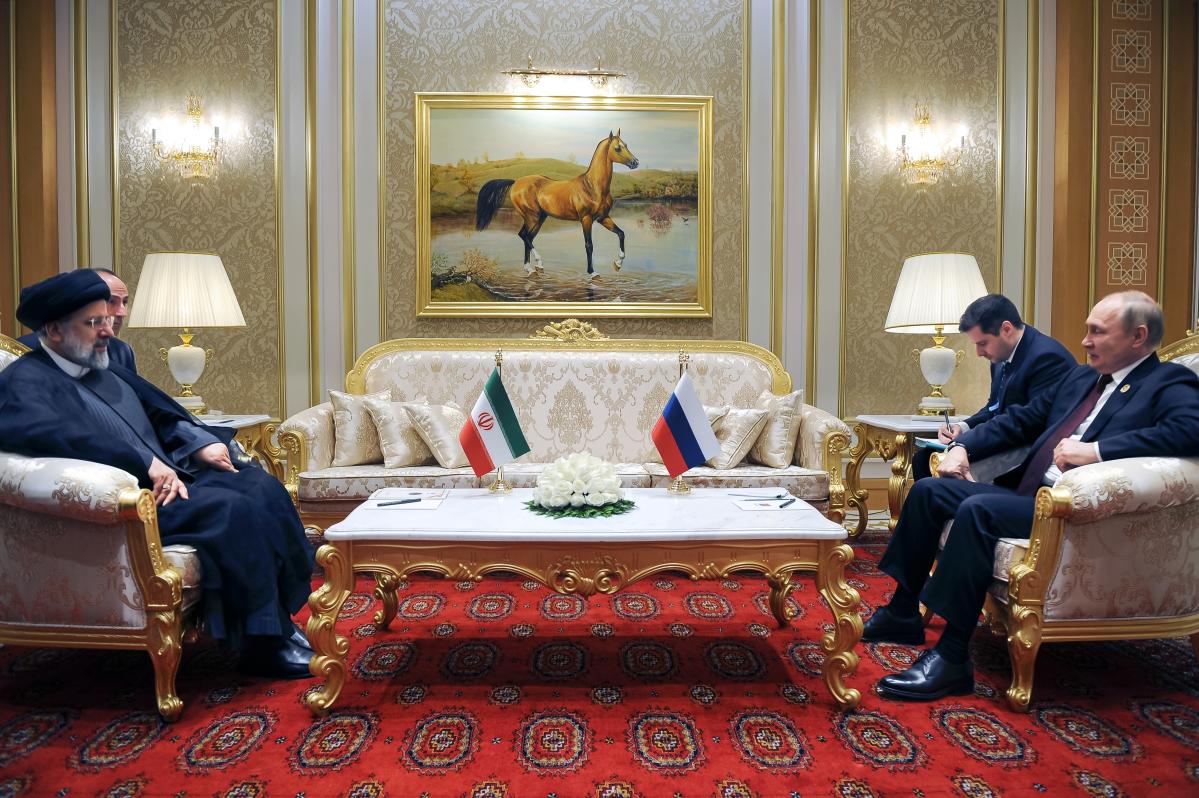
DUBAI, United Arab Emirates (AP) — Backed into a corner by the West, Iran is ramping up uranium enrichment, clamping down on dissent and deepening ties with Russia in a challenge to the U.S. and Europe.
Russian President Vladimir Putin heads to Tehran next week to meet with Iran’s leader — his second trip abroad since sending troops into Ukraine. The surprise announcement came a day after the White House said Tehran is preparing to send armed drones to Russia for use in Ukraine and before U.S. President Joe Biden headed to Israel and Saudi Arabia.
Tehran, severed from the global banking system by Western sanctions, wants to show it has alternatives. Talks to revive the 2015 nuclear deal, which eased sanctions on Iran in return for curbs on its atomic program, are at standstill.
Pressures are mounting on the Islamic Republic, with its economy shrinking and its people struggling, with no relief in sight.
A look at the challenges facing Iran, and what it means for the world:
A BREWING NUCLEAR CRISIS
Former U.S. President Donald Trump withdrew Washington from the nuclear deal between Tehran and world powers in 2018 and sought to squeeze Iran economically until it returned to the negotiating table. A defiant Iran resumed prohibited nuclear work.
Biden took office with a promise to restore the deal. Then hard-line cleric Ebrahim Raisi became Iran’s leader, and the nuclear talks have hit a stalemate.
The International Atomic Energy Agency, the U.N. nuclear watchdog group, reports that Iran now has 43 kilograms (over 94 1/2 pounds) of uranium enriched to 60% — a short step from weapons-grade levels. That’s enough fissile material for a weapon, if it chose to pursue one. However, Iran would still need to design a bomb and a delivery system, which likely would take months. Tehran is spinning more advanced centrifuges and has dismantled over two dozen IAEA cameras monitoring its work.
Iran insists its program is for peaceful purposes. U.N. experts and Western intelligence agencies say Iran had an organized military nuclear program through 2003.
Experts say Tehran increasingly sees a future without the nuclear accord, known as the Joint Comprehensive Plan of Action, or JCPOA, setting the stage for a possible crisis.
“The Iranians have come to the conclusion that the JCPOA is no longer serving their interests,” said Ali Vaez, the International Crisis Group’s Iran project director. Iran can’t guarantee the U.S. won’t again quit the pact and reimpose sanctions if a new president takes office in 2025.
“That political risk is something no one wants to shoulder,” Vaez added.
The stakes extend beyond Iran. Israel, its archrival and the sole nuclear power in the region, has threatened military strikes on Iranian nuclear facilities.
“Iran could enrich to 90%, but that would be a very dramatic escalation, and I’m pretty confident that would spark a (military) reaction,” said John Krzyzaniak, an Iranian proliferation expert at the Wisconsin Project, referring to weapons-grade enrichment levels.
IRAN’S INTENSIFYING CRACKDOWN
In 2019, some believed that Iran’s 40-year-old revolution could be undone by a 50% fuel price increase, and the country’s security forces responded ruthlessly to nationwide protests.
Nearly three years later, Iran remains under crippling sanctions. Inflation has skyrocketed, eating away at workers’ incomes. The Iranian currency has plunged, wiping out savings. The government has cut subsidies on food staples, stoking public outrage. In May, a 10-story tower collapsed in southwestern Iran, killing at least 41 people and exposing corruption.
To stave off unrest, authorities have recently arrested protesters angry about high prices, teachers’ union activists, acclaimed filmmakers and a prominent reformist politician.
Two of the detained dissident filmmakers had allegedly voiced support for demonstrations over the building collapse.
Facing pressure over its failure to deliver on promises of sanctions relief, the “system is directly signaling to the Iranian people they’re not going to tolerate dissent,” said Sanam Vakil, deputy director of the Middle East and North Africa Program at Chatham House.
That message has gained momentum as a kind of shadow war between Israel and Iran moves into the open — on the high seas and on Tehran’s streets.
“Ordinary Iranians lobbying for better rights are going to be more persecuted because the crackdown is now in the name of national security,” Vakil added.
ALLIANCE WITH RUSSIA
Facing a Western economic backlash over its action in Ukraine, Moscow sees Tehran as a key partner and potential source of arms. Amid intensifying diplomatic isolation, Iran has increasingly found common ground with Russia, including a shared adversary in Washington.
Biden is visiting the Middle East this week — first to Israel, Iran’s biggest foe, and then to Saudi Arabia, another Tehran rival — and it was no coincidence the White House said Iran was preparing to provide Russia with drones and training just days before the trip.
“We think that this is of interest, to put it mildly, to the countries we will be visiting on this trip,” said National Security Adviser Jake Sullivan.
Citing a Russian Foreign Ministry source, the Interfax news agency described the drone deliveries as “disinformation” intended to “further fuel anti-Iranian sentiments in the Arab states.”
One aim of Biden’s trip is encouraging Arab nations to strengthen security alliances, built on the shared fear of Iran.
“We see the emergence of two opposite blocs,” said Yoel Guzansky, a Gulf expert and senior fellow at the Institute for National Security Studies in Tel Aviv. “The U.S. is trying to unite the Arab world … with Russia and Iran and perhaps China on the opposite side.”
Military coordination between Tehran and Moscow has intensified since they pooled efforts to shore up Syrian President Bashar al-Assad’s government in the country’s civil war.
Iran’s advancing drone capabilities could prove valuable for Russia, Krzyzaniak said. The Iranian aircraft, in some cases mimicking the designs of U.S. military drones, are battle-tested by Yemen’s Houthi rebels fighting a Saudi-led military coalition, according to Western officials and U.N. experts.
But the Iran-Russia relationship is not free of friction.
Their former empires were centuries-old rivals, and Russia’s occupation of Iran during World War II — and its refusal to leave afterward — bred decades of distrust.
Those old differences are playing out in new ways. Sanctioned Russian oil, which is now more discounted than crude from Iran, is eating into Tehran’s share of the crucial Chinese market and forcing it to slash prices, experts say.
Other differences include Putin’s friendly ties with Israel. As part of a delicate balancing act, the Kremlin has struck deals in Syria, such as in 2018 when Moscow had Tehran keep its fighters away from the Golan Heights to accommodate Israeli concerns.
But with pressure growing on both countries, their bond seems sure to grow.
For Russia, Iran represents a source of expertise in how to avoid sanctions and access the world’s black markets. Bilateral trade is booming, according to Tehran-based political analyst Saeed Leilaz, noting Russia has increased its imports of Iranian produce and seeks trade routes to India.
For Iran, “foreign policy is decided based on what the system sees as in the best interest for its survival,” said Vaez, of the International Crisis Group.
___
Associated Press writers Emily Rose in Jerusalem, Vladimir Isachenkov in Moscow and Aamer Madhani on Air Force One contributed.




